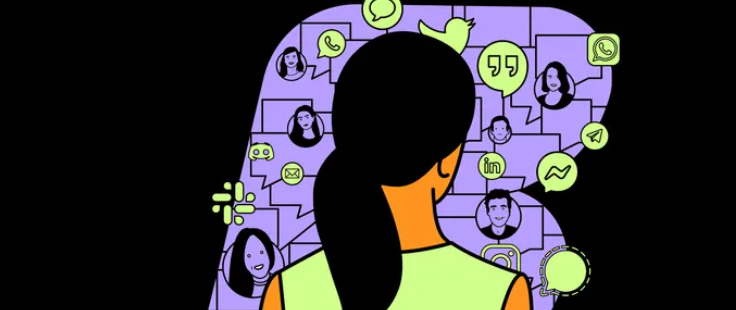My phone is absolutely littered with messages. I have a mess of messaging apps: Messages, WhatsApp, Signal, Telegram, GroupMe, Google Chat, Discord, Slack, Messenger, and Snapchat. Then there are all the apps that aren’t necessarily for messaging but still offer it as a feature, like LinkedIn and Instagram and X. Reddit and TikTok both can act like messaging platforms; I get messages through Tumblr sometimes; Skype is still sort of around.

Chat is a core part of the modern internet experience, which is why everyone wants a piece: if you can build the app in which people talk to their friends, you’ve built the stickiest thing in tech. But in reality, all that competition means we spend our days endlessly checking inboxes and trying to remember who we talk to where.
How did it get to be like this? And is there a way for the messaging world to make more sense? Eric Migicovsky, the co-founder of Beeper, thinks so. On The Vergecast, for the second episode in our miniseries about connectivity, he walks us through a history of online chat — and a plan to make things better.
Beeper is, in some ways, trying to bring back the good ol’ days of messaging apps. Fifteen years ago, there were lots of competing platforms — MSN, Yahoo, AIM, and others — but you could use an app like Pidgin or Jabber to bring them all together. The systems weren’t completely interoperable the way email is, but it didn’t really matter; you could just talk to your friends without worrying about what platform they used.
When mobile took over, Migicovsky says, that cross-platform compatibility disappeared. The underlying peer-to-peer tech that made them work simply didn’t make sense on mobile devices. “And new apps sprung up to fill the void,” he says. “WhatsApp, iMessage, Telegram, Snapchat: they were all built mobile first. They had many new features, like end-to-end encryption, because you had this device that was you. You have your phone, and it’s always with you, and you only have one phone at a time. And so these new apps or these new systems could afford to have a closer connection to your personal identity.”
That also, of course, coincided with a huge jump in the number of people using these services every day, and so they became entrenched. They also began to try to build businesses on top of messaging, which is tough to pull off. “If you look at the actual businesses that have been built on top of chat or adjacent to chat, chat does not make any of these big companies money,” Migicovsky says. What they provide instead is lock-in. People buy iPhones to be blue bubbles; users check Snapchat a hundred times a day because that’s where their friends are. That, of course, means the messaging apps have no reason at all to open up to other services. Because what if you leave?
Beeper started, Migicovsky says, to solve his extremely familiar problem of too many messaging apps. “I basically had this lookup table in my mind that matched each person, each friend, each family member, and which app they used.” Beeper aims to obviate that by bringing all your messaging services into a single app, with a single inbox, where all you have to do is chat.
The app has been around for a couple of years now and mostly works quite well. (There are times when it feels like Beeper’s connection to other messaging apps is held up by duct tape and bubble gum, but it has gotten more stable over time.) The question for Migicovsky now is what to do next. Do you try and reinvent the way we chat altogether? Do you tackle video chat and other obnoxiously siloed systems? How do you make money? Can you continue to exist when the messaging apps probably wish you didn’t? Or conversely, as laws like the EU’s force messaging apps to interoperate, does Beeper even need to exist?
Migicovsky, for his part, seems to still be focused on the simplest version of his goal. “If you look at every computing platform, the killer app has always been chat.” He’s mad that he has smart speakers all over his house that can’t send a text message. He wants to message directly from his headphones to your headphones.
“The end result here is telepathy,” he says. “How can I send a message to you as a person rather than you as an inbox?”

